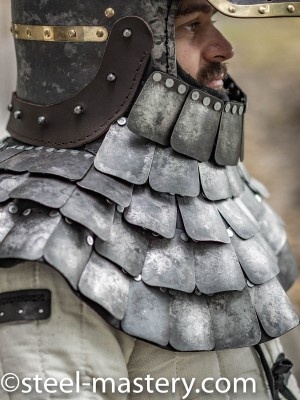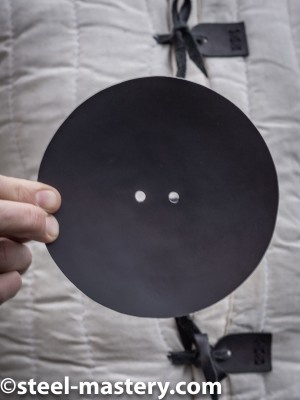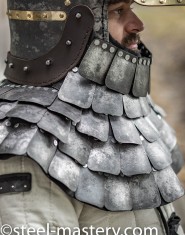Riguardo Cuffie e ventagli
This section contains various models of mail coifs and aventails. Here you can order chainmail armour for additional protection of head and neck.
We make every model by hands for personal parameters and regards of customer. Chainmail armour is manufactured in accordance with samples, which are kept in museums or painted in ancient manuscripts.
To become an owner of handcrafted aventail or chainmail hood, you need to do few simple steps:
- Open the page of required item;
- Choose type of metal rings (mild/stainless/blued steel).
If you have any difficulties with choosing, please do not hesitate to contact our manager. We will help you to define your size, required model and its complement.
Once all options are chosen, you need to add item to the cart and make a payment. After that, manager will contact you with measurement request and specification of order’s details.
All samples are perfect for participation in the tournaments of medieval fencing, historical festivals, bohurts and reenactment events. Depending on the complement, such defense is compliant to the standards and rules of such social movements, as SCA (The Society for Creative Anachronism), HEMA (Historical European Martial Arts), HMB (Historical medieval battles).
If you did not find the wished armour in this section, we can make it individually for you. Just send picture with detailed description to [email protected]. Then we will quote you and discuss details of order.
Byzantine equestrians were using chainmail protection of head and neck in the first millennium A.D. European knights were wearing such armour in the X-XIV centuries, but the most popularity it had in the XII-XIII centuries. Mail head protection was also in wide use among warrior of Ancient Rus.
Primarily, chainmail hood (coif) was a single whole with mail shirt – hauberk. Starting the XIII century, blacksmiths started to make it as separate protective element, so coif could be worn together with hauberk or independently. Knights were usually wearing Norman-type helmet or topfhelm over coif. Such combination of armour was protecting head from slashing blows. Although, some ancient manuscripts show knights, who were wearing chainmail coif only.
Some hoods were one-piece. Other models had a flap, which was covering a chin. This flap was attached to the coif on both or one (usually, left) temporal sides. Length of hood could vary, but always reach collarbones.
Mail aventail did not cover the head, but protected neck and throat. It could be attached to the helmet of almost any type. Small holes were drilled on the edge of dome in that case. Leather string was pulled through these holes, and aventail could be attached to this string. Some armourers were installing vervelles – special clinches for aventail attaching.
Aventail could be attached to camail as well. There was a small spherical or semi-spherical shape, which covered only top of head. In this case, length of mail sheet was long enough to hide neck, shoulders and even chest of warrior.
Good flexibility of mail protection was the main advantage of this armour. It did not hinder the movements of fighter, that is exactly why it gained so big popularity among medieval warriors. Besides, aventail provides with good ventilation and does not allow intertrigos. However, many research workers agree that medieval knights were wearing chainmail armour over the thick padded clothing (gambeson or aketon). It was necessary for better amortization of blow, prevention of chafing and abscesses.





